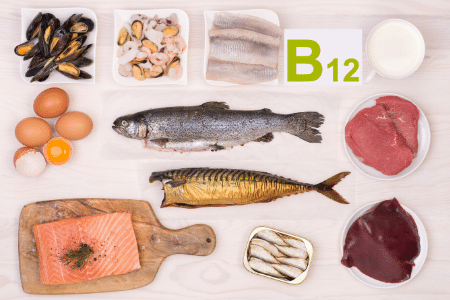How Vitamin B12 Affects Immunity
Vitamin B12 is also known as cobalamin. It is highly utilized by body in production of red blood cells and immune protecting white blood cells. The immune system is known for protecting the body from bacterial, viral, and fungal infections. One of the best way to ensure your body is healthy is by maintaining proper health measures and levels of vitamin B12. Vitamin B12 is found in animal foods like eggs, meat, animal products, and vitamin supplements.
Exclusive Insights you need to know about Vitamin B12
Nowadays, vitamin B12 deficiency is a hot topic of discussion amongst people. Most of them are wondering whether they consume the required vitamins daily to boost their health. According to the USDA, anyone above the age of 12 should take at least 2.4 micrograms (mcg) of Vitamin B12 every day.
However, a large study showed that 40% of the U.S population had low levels of vitamin B12, low enough to cause symptoms. It has come out that diet is not the only factor leading to vitamin B12 deficiency, but it’s also genetic. The amount of Vitamin B12 your body needs depends on your age and health situation.
For instance, if you are over 19 years, you should take at least 2.4 mcg per day. For someone that is pregnant, you need more because the fetus needs the vitamin to develop. Still further, a lactating woman requires even more to ensure that the baby gets enough of vitamin B12.
At the age of 50 you are increased risk of not getting enough vitamin B12. This is because your body is inefficient in absorbing the required amounts of the vitamin. Therefore, ensure you include vitamin B12 supplements everyday. Additionally, if you have diabetes or Crohn’s disease, you are at risk of vitamin B12 deficiency and as a result of a weakened immune system.
What happens when your B12 is low?
For some, it might take a long before you realize that your vitamin B12 levels are low. Below are some of the symptoms you may encounter when your vitamin B12 is low.
Fatigue
If you feel abnormal fatigue often, your vitamin B12 levels might be low. This is could be because you don’t have adequate red blood cells to transport the blood around your body. Or fatigue might be to less energy production which B12 helps create.- Appetite and weight loss
Vitamin B12 deficiency can lead to digestive problems, thus low appetite and fluctuations in weight. - Mouth pain
At times, you may encounter swollen red tongue, mouth ulcers, and burning like sensation. This irritation may occur as a result of low oxygen reaching your mouth. - Alertness problems and loss of memory
Research has shown that a common source of memory loss is vitamin B12 deficiency. Memory loss can occur due to less oxygen and energy reaching your brain, which is linked with cognitive impairment. Besides that, vitamin B12 is known help maintain healthy nerves, and with deficiency, you can encounter memory loss.
Benefits of Vitamin B12 to Your Immunity and More
Vitamin B12 helps in boosting the immune system; thus, you need enough of it. Some of its significant benefits include:
- Formation of Red Blood Cells
Red blood cells are usually small and round. When deficiency occurs, they grow larger, developing an irregular shape, thus hindering them from moving around the bone marrow. At this point, you can be at risk of suffering from megaloblastic anemia. Vitamin B12 vitamin helps your body in the production of enough red blood cells that transport energy to your vital body organs. - Maintains Healthy White Blood Cells
White blood cells are your bodies natural defender. Vitamin B12 is intimately involved the development of strong & healthy white blood cells. - Reduces the risk of depression
Vitamin B12 helps in regulating metabolizing serotonin, thus improving your alertness and moods. Additionally, enough levels of vitamin B12 are linked to the quick recovery of depression disorders. Prevention of birth complications
According to the study, a high amount of vitamins are essential during pregnancy. It enhances the healthy development of the fetus’s brain, thus preventing premature births and miscarriages.- Maintain Good Energy Levels
All vitamins help in the production of energy. Vitamin B12 helps in converting carbohydrates into glucose, which is converted to energy. With low levels of Vitamin B12, you may encounter fatigue and lose balance while walking due to the low production of energy. - Boosts the nervous system
Vitamin B12 maintains sheaths that protect the central and the peripheral nervous system. Additionally, it produces S-adenosyl methionine (SAM), a compound that helps in stress management. On the other hand, vitamin B12 vitamin increases the level of concentration and attention. Besides all that, vitamin B12 plays a significant role in the prevention of loss of brain neurons to older people. - Maintain good heart and eye health
Having in mind that heart complications are the leading causes of death globally today. Vitamin B12 helps in reducing the significant factors that cause heart disease. High blood pressure and high homocysteine levels are some of the factors causing heart disease vitamin B12 has been proven to help reduce the risk. Vitamin B12 minimizes the risk of macular degeneration (an eye disease) that affects your vision. A study involving 5,000 people over 40 years has shown that taking vitamin B12 supplements reduces the risk of eye problems in older adults
Ways to Strengthen your Immune System
Consume food rich in vitamin B12
For you to reduce the risk of infections and diseases, you should take foods like Eggs, meat, fortified cereals, and Vitamin B12 supplements. These foods are rich in vitamin B12 vitamin, and they ensure that your body has enough red blood cells.- Get enough sleep
Research shows that healthy adults are those who sleep for at least 6 hours every night. Furthermore, getting more sleep when unwell enhances immunity to fight the illness. - Moderate exercise
Having a moderate exercise every day helps in regular regeneration of the immune system. Walking, jogging, or swimming are among conventional physical workouts to maintain a healthy body. - Drink enough water
Often, dehydration causes headaches and digestion problems. Water has no sugar, calories and additives. - Eat whole plant foods
Taking foods rich in antioxidants and nutrients helps to reduce the chances of inflammation by combating excess radicals in your body. Vegetables, legumes, nuts and fruits contain high amounts of nutrients. - Reduce added sugars
Reducing your sugar intakes can minimize the risk of weight loss, obesity and heart disease. Besides, low sugar intake decreases inflammation and immune boosting.
Maintaining a healthy immune system is easier said than done. Considering the right diet and regular exercise will get you on the right foot and help prevent you from infections. Ensure you are taking immune boosting measures and the right supplements to stay healthy.
References:
https://www.pharmacytimes.com/
https://www.health.harvard.edu/
https://www.health.com/
https://modernbodyclinic.com/


 Fatigue
Fatigue Prevention of birth complications
Prevention of birth complications Consume food rich in vitamin B12
Consume food rich in vitamin B12